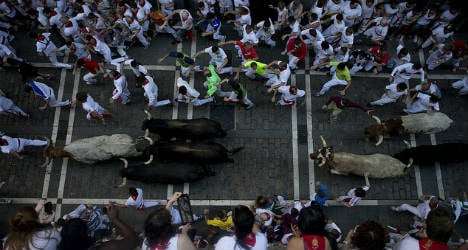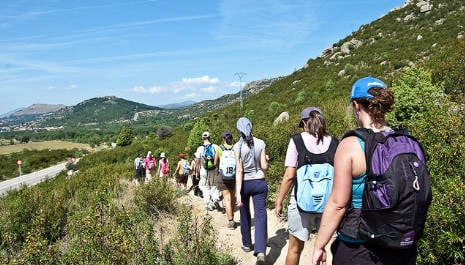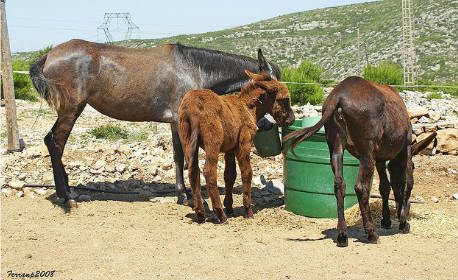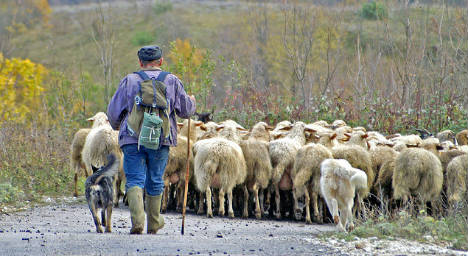Festival Hopping

Photo: Tammy Hineline/Flickr
Spain’s wide and often bizarre variety of festivals means that you could spend the year ticking them all off a massive bucket list. The most fantastic of them include La Tomatina (last Wednesday of August) where Valencians throw tomatoes at each other and San Fermin (July) where revellers run through the cobbled streets with fighting bulls. Tens of thousands of people from both Spain and abroad flock to these famous events, so book early.
Camino de Santiago

Photo: Jesus Perez Pacheco/Flickr
This arduous pilgrimage to the city of Santiago de Compostela was once one of the most important in the Middle Ages, as it is said that the remains of St. James the apostle are buried there. Nowadays, the pilgrimage is by no means limited to the fervently religious, and hundreds of thousands of travellers and hikers seek out the route to have their own kind of spiritual experience away from the excesses of modern life. There are plenty of different routes to choose from, so you can really explore the countryside. And it's not just about walking either. People also cycle towards Santiago, or maybe riding a horse is more your thing.
Charity Work

Photo: Ferran Pestansa/Flickr
Volunteering opportunities in Spain can stretch from anything from donkey conservation projects in Andalusia to marine community projects in Valencia. Scouring Twitter is a great way of finding local charities who are often after regular hands-on volunteers or even just helpers in the office; these are also very well advertised on the website http://www.hacesfalta.org/. Other areas have specific websites that post constantly changing volunteering opportunities regularly, such as http://www.servethecity.es/ which operates in Madrid and the region of Valencia.
Become a Wwoofer or WorkAway Volunteer
Nope, nothing to do with dogs – wwoofing is where you volunteer at an organic farm or ecological project.In return for your work you get free bread and board, so it’s a good opportunity to see some of Spain’s enigmatic countryside, as well as demonstrating to any future employer that you know how to work hard.
www.workaway.info is another volunteering website that also advertises similar opportunities – often helping at a yoga retreat or building a yurt – as well as volunteering in restaurants and hostels.
Become a shepherd in Catalonia

Photo: Gianluca Carnicella/Flickr
Catalonia has a specific school for wannabe shepherds; it all starts with a month of classroom study in the rural Pyrenees and then four months of practical training with a veteran shepherd. Once trained, you could earn up to €2000 over the summer – the downside is you’ll probably make more sheep friends than human ones, but if you enjoy solitude then this is a handy way to earn money at the same time.
Au pair
The age-old, go-to job for any young person in a foreign country. Your English-speaking skills are your USP, so take advantage again of the free accommodation in addition to a weekly stipend. In the summer you’ll find plenty of opportunities on Facebook as former au pairs leave their families, so it’s worth going on a group-joining spree. Otherwise you can use a website like http://www.aupairinspain.com/.
Teach English
English lessons are high in demand in Spain as many Spaniards are trying to become more employable in light of the economic crisis. You can advertise for private lessons on websites like www.lingobongo.com or www.tusclasesparticulares.com. It’d be worth your while doing a TEFL course such as the CELTA before you go as it means you could also charge more money and work at better schools. These teaching courses can be done online or in many language academies both in the UK and Spain. It is worth noting, though, that the better schools tend to prefer courses with a practical teaching to the online variety.
Learn a new skill

Photo: David Diaz/Flickr
Use the year to learn something that you couldn’t do in the UK (or at least not nearly as well). San Sebastián is home to Spain’s longest running surf school Pukas Surf, or if you’re more musically inclined, you could go to Andalusia and learn how to play Spanish guitar or perform flamenco. A particularly great flamenco school in Granada is Carmen de las Cuevas, which offers courses in singing, dancing, compas (clapping) and history, in addition to Spanish classes.
By Sophia Smith Galer


 Please whitelist us to continue reading.
Please whitelist us to continue reading.
Member comments